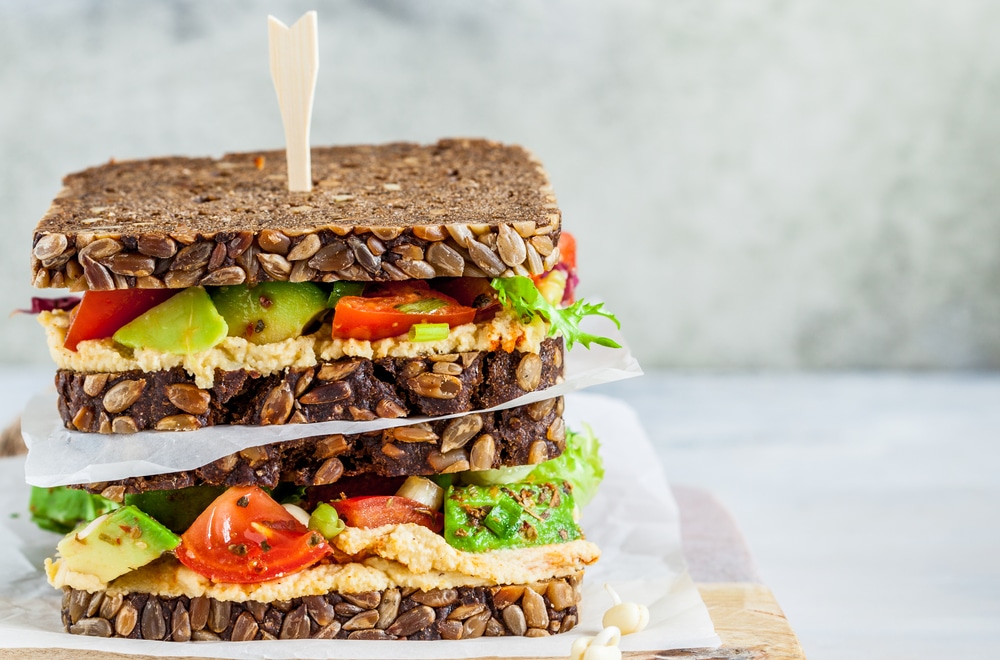Can You Lose 10 Pounds in a Month? Tips From a Fitness Expert

Is it possible to lose 10 pounds in a month? It’s certainly possible with dedication, proper nutrition, and plenty of exercise!
Certified Personal Trainer and Health Coach Chris Freytag offers eight practical tips for safely losing 10 pounds in 30 days.
1. Track Your Calories

Photo Caption: Shutterstock
The truth is, if you eat poorly, you’ll feel poorly! But the number of calories you’re consuming still matters, especially when you have the aggressive goal of losing 10 pounds in one month.
The overall equation for weight loss comes down to this: you have to burn more calories than you take in. Calorie consumption is something you really have to watch.
While everyone’s caloric needs are different, for the average woman looking to lose weight, eating around 1,600 calories per day will help you drop pounds.
2. Reduce Your Sugar Intake

Photo Caption: Shutterstock
Consuming a bunch of refined sugar activates fat storage in the body, which is hard on your metabolism.
Some of the biggest culprits are sugary beverages, including sodas, specialty coffees, fruit juices, and energy drinks. In fact, sugar-sweetened beverages (SSBs) are the largest contributor of sugar intake in the United States!
Sugary drinks and foods can also lead to a temporary spike in blood sugar followed by a crash, which makes you feel hungry or thirsty soon after. (Thus, making you eat and drink more.)
Try cutting down on sugar by staying away from things like pastries, cookies, donuts, candy, cupcakes, granola bars, and sweetened yogurt. (Moderation is key!)
3. Stick to Clean Eating

Photo Caption: Shutterstock
In general, fill up your plate with veggies, fruits, lean protein, and healthy fats with real ingredients.
Other tips include:
- Cut out processed foods, packaged foods, and artificial ingredients.
- Get rid of your soda and sugary drink habit to make weight loss easier.
- Eliminate added sugars, such as white sugar, brown sugar, fructose, and molasses.
- You should also eat more healthy, filling foods to avoid grabbing high-carb and high-calorie snacks.
Try foods like:
- Boiled or baked sweet potatoes
- Beans, peas, chickpeas, and lentils
- Whole fruits and vegetables
- Eggs
- Nuts
- Lean meats, poultry, and fish
4. Add More Fiber to Your Diet

Photo Caption: Shutterstock
When you’re eating for weight loss, a lot of people are left feeling hungry due to a lower number of calories consumed.
Adding fiber to your meals allows you to feel fuller for longer! Fiber also helps to remove waste from the body, keeping you regular and less bloated.
Some of the best high-fiber foods include oats, whole wheat bread, bananas, and carrots.
5. Drink More Water

Photo Caption: Shutterstock
Removing sodas and other sugary beverages plays a big role in weight loss—and you can replace them with water!
Drinking plenty of water is essential for weight loss because it:
- Helps suppress your appetite
- Stimulates metabolism
- Improves your workouts
- Helps remove body waste
- Saves you calories when you drink it instead of soda, juice, and sweetened tea or coffee
The recommended water intake is around 9 cups daily (8 oz each) for women and 13 cups for men.
6. Eat a Protein-Packed Breakfast

Photo Credit: Shutterstock
A high-protein breakfast can help you stay on track with your weight loss goals. Eating more protein can reduce the number of daily calories you need to consume, and high-quality protein can also cut down on your calorie intake.
High-protein foods include eggs, cheese, yogurt, eggs, peanut butter, and certain breakfast cereals.
7. Try High-Intensity Interval Training (HIIT)

Photo Credit: Shutterstock
Dietary choices are helpful with weight loss, but you won’t see any results without exercise!
Try getting your cardio and strength training done simultaneously by doing high-intensity interval training (HIIT).
This type of training utilizes interval workouts, which burn more calories in less time by using short bursts of all-out effort followed by brief rest periods. HIIT workouts get your heart pumping hard and typically use a series of strength moves to do so.
This allows you to tackle your cardio and strength simultaneously, which is especially helpful if you’re short on time.
8. Focus on Sleep and Stress Management

Photo Credit: Shutterstock
Sleep and stress are two factors that are often overlooked when looking to lose weight, but they matter!
Stress causes your body to release cortisol (i.e., the stress hormone), and too much of it can cause belly fat. Work on minimizing stress as much as possible by practicing deep breathing and meditation, journaling, taking long walks in nature, or doing yoga.
As for sleep? Plenty of research associates poor sleep habits with less weight loss. For example, a study in the Annals of Internal Medicine found that when dieters cut back on sleep over a 14-day period, they lost 55% less weight from fat. Getting too little sleep can also throw two of your body’s hunger hormones out of whack—leptin and ghrelin—which can cause you to hold onto more fat and crave sugary, salty foods more frequently.
Aim for 7-9 hours of sleep per night. If you are having trouble falling asleep, you can try meditation, taking magnesium or melatonin, and reducing or eliminating screen time before bed.
While losing ten pounds in a month is not easy, it is doable! Just remember that proper nutrition, exercise, and serious commitment are required for this kind of weight loss.
